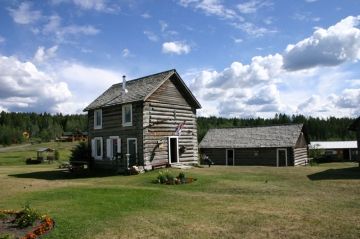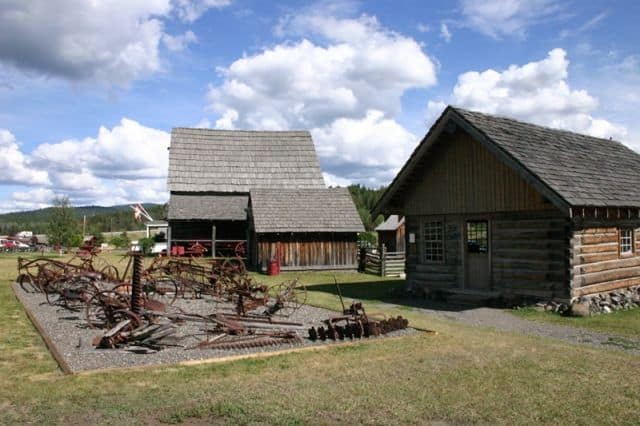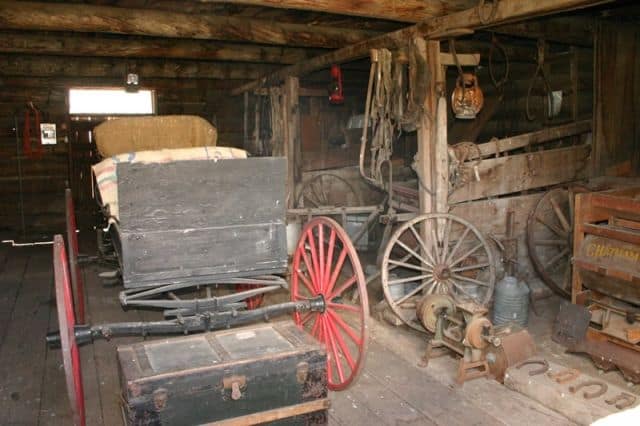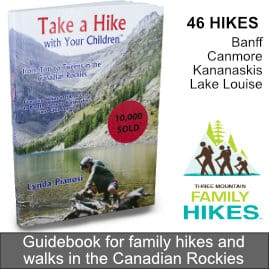108 Mile Ranch Heritage Site

Difficulty: Easy - Family
Park Amenities:
is a heritage site dating back to the Cariboo Gold Rush days of the late 1800s and early 1900s located in 108 Mile House, BC, Canada. Starting back in 1867 the ranch played a big part in the development of the region as a Post House servicing the miners and trappers traveling the legendary Cariboo Wagon Road which once called "the eighth wonder of the world."
 The Cariboo Road was built by blasting through the Fraser Canyon so to reach the goldfields in Barkerville. The entire route covers 642 kilometres (400 mi.). Along the Cariboo Wagon Road many, what was called back then, "Mile Houses" were built along the route servicing the miners. All the "MIle Houses" were named by how far they were located from the community of Lillooet including 108 Mile Ranch (108 Miles from Lillooet).
The Cariboo Road was built by blasting through the Fraser Canyon so to reach the goldfields in Barkerville. The entire route covers 642 kilometres (400 mi.). Along the Cariboo Wagon Road many, what was called back then, "Mile Houses" were built along the route servicing the miners. All the "MIle Houses" were named by how far they were located from the community of Lillooet including 108 Mile Ranch (108 Miles from Lillooet).
In 1875, Agnus and Jim MacVee took over the ranch and began the 108 Hotel. According to legend the MacVees craved gold in a big way and were prepared to commit murder to obtain it. It was said that 50 gold nugget carrying guests of the hotel met there deaths at the hands of the MacVees and their bodies were tossed into the nearby lakes.
In 1885, the murderous plot was uncovered and well waiting in jail, Agnus committed suicide and the ranch changed hands again. William Walker took ownership in 1880 and built an ice house, telegraph office and blacksmith shop. Stephen Tingley took over in 1891 and built a small log barn, carriage stable and bunkhouse.
Today, the heritage site is a popular stop on any road trip through the Cariboo region. The ranch is rich in history with 10 original buildings housing the past including a one-room schoolhouse, trapper's cabin, BX stagecoach barn, a blacksmith shop, post house, telegraph building and a Log Clydesdale Barn.
The ranch covers over 25,000 acres and consists of rolling hills, grasslands, lakes and meadows. Although only a small portion of the land is the actual heritage site. The ranch acts as a rest stop for travelers also. The site includes a series of picnic tables, washrooms, a small picnic shelter, information boards and a very large parking lot friendly to RVs and bus tours.
At the south end of the parking lot is a tunnel leading under the highway connecting to the 108 Community Trail Network and Easements. It is a massive system of trails used for hiking, biking and horseback riding in the sunshine months and cross country skiing in the winter months.
There is a good selection of easy grade, intermediate and advanced trails to explore. Many trails become part of loop routes leading to lakes like Sucker, Soda, Tatton and Carment Lakes and Warming Huts (3 in total). At the trailhead tunnel is an extensive trail map with distances and routes.
Exploring 108 Mile Ranch | 108 Mile House in 100 Mile House, BC, Canada
Address:




